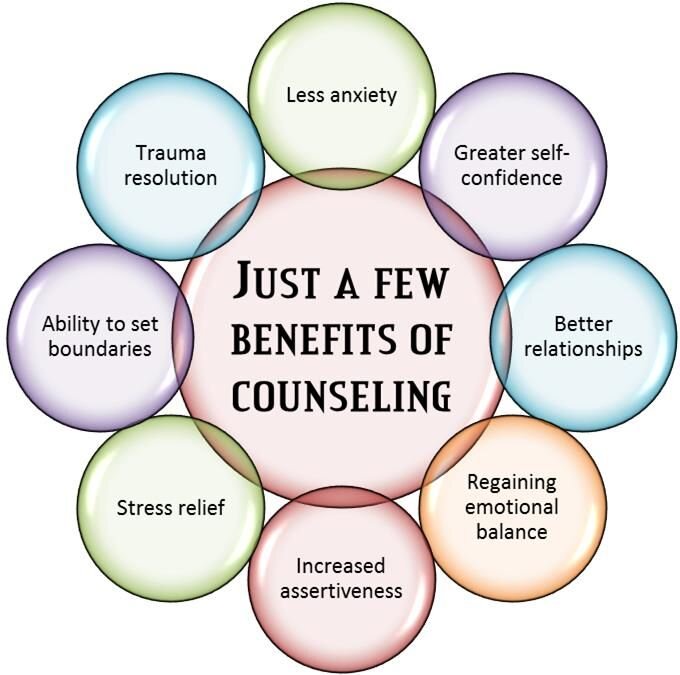Unlocking the Tricks of Mental Wellness: A Summary of Counseling and Therapy Choices
Psychological health is a complex and critical element of overall wellness. Many therapy and therapy options exist to deal with different psychological obstacles. Each approach offers unique benefits and techniques tailored to individual requirements. Recognizing these choices is essential for anyone looking for to improve their mental health and wellness. Couples Therapy. What variables should one take into consideration when exploring these avenues? The answer might expose a path to a healthier psychological state
Recognizing Mental Health And Wellness and Its Significance
Mental health and wellness incorporates the psychological, mental, and social well-being of people, substantially affecting exactly how they think, feel, and act. Its value can not be overemphasized, as it influences every element of life, consisting of partnerships, work efficiency, and total lifestyle. Individuals with good psychological health have a tendency to manage stress better, keep healthier partnerships, and make educated choices. Alternatively, bad psychological health and wellness can result in emotional distress, damaged functioning, and numerous mental conditions, which may need professional treatment. Comprehending psychological wellness is important for identifying the indications of distress and the demand for support. Recognition likewise advertises empathy and minimizes preconception, encouraging individuals to look for aid when necessary. By prioritizing mental wellness, communities can cultivate environments that sustain emotional health, ultimately causing healthier, much more durable people. This structure offers as a vital action towards effective mental health and wellness counseling and therapy choices.
Kinds Of Counseling Methods
Therapy techniques differ extensively, each customized to meet the one-of-a-kind needs of individuals looking for support. Amongst one of the most common types are cognitive-behavioral treatment (CBT), which focuses on recognizing and altering negative idea patterns, and person-centered treatment, which stresses compassion and acceptance. Psychodynamic therapy checks out subconscious processes and previous experiences to comprehend present habits, while solution-focused short treatment aims to determine remedies rather than investigate problems.Additionally, family treatment addresses relational characteristics and interaction within family members, cultivating much healthier interactions. Group therapy provides a communal space for participants to share experiences and support each other. Various other strategies consist of existential treatment, which urges people to discover significance and function, and art or music therapy, which makes use of imaginative expression as a healing tool. Each method supplies unique methods and philosophies, permitting clients to locate the most ideal approach for their personal development and recovery trips.
Discovering Different Therapy Methods
In the domain of mental wellness counseling, numerous treatment techniques provide distinct strategies to therapy. Cognitive Behavior Therapy stresses the connection between thoughts and actions, while Psychodynamic Treatment checks out unconscious influences on psychological well-being. Furthermore, Mindfulness-Based Techniques advertise present-moment understanding as a way to improve emotional regulation and general psychological health and wellness.
Cognitive Behavior Treatment
Cognitive Behavior Therapy (CBT) attracts attention as one of one of the most widely practiced and looked into modalities in psychological health and wellness therapy. This strategy focuses on the affiliation between feelings, ideas, and behaviors, stressing that altering unfavorable idea patterns can bring about enhanced psychological health and behavioral changes. CBT is structured, generally involving a limited number of sessions, and intends to furnish people with sensible abilities to manage their signs. It is effective for a range of problems, consisting of anxiety conditions, clinical depression, and post-traumatic stress disorder. By utilizing methods such as cognitive restructuring and direct exposure treatment, CBT cultivates durability and encourages customers to challenge challenges head-on, making it a valuable alternative in the landscape of mental wellness treatments.
Psychodynamic Treatment Methods
Psychodynamic treatment approaches provide a deep exploration of the unconscious mind and its impact on behavior and psychological well-being. Rooted in Freudian theory, these methods stress the significance of very early childhood years experiences and subconscious problems. Via techniques such as free organization, dream evaluation, and transfer, individuals get insight into their thoughts and sensations, promoting self-awareness and understanding. This restorative modality encourages clients to reveal quelched emotions and unsolved problems, which can be critical in dealing with current emotional obstacles. By checking out the interaction between existing habits and past experiences, psychodynamic therapy aims to promote psychological healing and personal growth. Ultimately, it gives a structure for people to check out complex internal dynamics that affect their psychological health and wellness.

Mindfulness-Based Methods
While typical treatments commonly focus on previous experiences, mindfulness-based techniques prioritize present-moment awareness as a pathway to emotional well-being. These methods, including mindfulness-based cognitive therapy (MBCT) and mindfulness-based tension reduction (MBSR), encourage individuals to involve fully with their ideas and sensations without judgment. Specialists discover to observe their psychological states, fostering a better understanding of psychological triggers and actions. This method not only alleviates signs of anxiety and clinical depression yet additionally enhances general mental strength. By incorporating mindfulness exercises, such as reflection and deep breathing, customers grow a feeling of tranquility and clearness. Eventually, mindfulness-based methods empower people to browse life's obstacles with enhanced recognition and acceptance, promoting a much healthier relationship with their thoughts and feelings.
The Function of a Therapist or Therapist
A skilled specialist or counselor plays an essential function in supporting people with their mental wellness trips. They provide a secure, non-judgmental area where customers can reveal their thoughts and feelings openly. Mental Health Resources. By utilizing various healing strategies tailored per individual's demands, therapists assist clients more check out underlying issues that may add to their psychological health challenges.Therapists use advice and tools to deal with anxiety, anxiety, anxiety, and various other psychological problems. Their training outfits them to recognize patterns in habits and believed procedures, helping with understandings that lead to personal growth. They additionally foster a strong restorative alliance, which is crucial for effective outcomes.Moreover, therapists stay fully commited to discretion and honest requirements, making certain a relying on atmosphere. Ultimately, the duty of a specialist or therapist is to empower individuals, motivating them to establish resilience and healthier coping approaches while guiding via life's complexities
Just how to Pick the Right Therapy or Treatment Choice
Picking the best therapy or treatment alternative starts with reviewing individual requirements. It is vital to comprehend personal challenges and objectives prior to checking out different therapy styles. This foundational action can greatly affect the efficiency of the picked technique.
Examine Your Requirements

Just how can people efficiently analyze their psychological wellness needs when evaluating therapy or therapy alternatives? They need to show on their psychological state and identify certain issues, such as clinical depression, anxiety, or relationship challenges. Journaling can be a beneficial tool for tracking thoughts and sensations gradually. Additionally, individuals might gain from seeking comments from relied on buddies or member of the family relating to regarded modifications in behavior or state of mind. It is additionally valuable to evaluate personal goals for therapy, such as enhancing coping skills or getting understanding into personal patterns. Looking into different therapy techniques and their suitability for particular demands can aid in making an informed choice. Ultimately, self-awareness plays a critical role in choosing the best path for mental wellness assistance.
Explore Treatment Styles
While traversing the varied landscape of therapy options, people need to take into consideration different styles of counseling to discover the very best fit for their one-of-a-kind requirements. Cognitive Behavioral Treatment (CBT) focuses on transforming negative idea patterns, while Psychodynamic Treatment discovers unconscious procedures and past experiences. Humanistic techniques emphasize personal development and self-actualization, fostering a supportive setting. Furthermore, mindfulness-based treatments cultivate present-moment recognition, assisting emotional guideline. For those looking for structure, Solution-Focused Short Therapy targets certain objectives and solutions. Group therapy gives a communal setup for common experiences and assistance. Eventually, individuals ought to review their preferences, comfort degrees, and specific difficulties, guaranteeing they select a healing style that reverberates with their individual trip toward psychological health.
Conquering Obstacles to Looking For Assistance

The Benefits of Counseling and Therapy for Mental Wellness
Seeking help for psychological wellness obstacles can lead to substantial improvements in overall well-being. Counseling and therapy provide individuals with a safe space to discover their feelings and ideas, promoting self-awareness and individual growth. These professional solutions equip customers with dealing approaches and analytic abilities customized to their one-of-a-kind situations.Moreover, therapy can reduce symptoms of anxiety, depression, and various other mental health disorders, boosting psychological strength. Normal sessions advertise liability and urge individuals to set and achieve individual goals. Through various healing techniques, such as cognitive-behavioral therapy or mindfulness techniques, customers learn to reframe negative ideas and establish healthier behaviors.Additionally, the healing partnership itself can be a source of assistance, assisting to deal with seclusion and loneliness. On the whole, taking part in counseling and treatment is a positive action towards accomplishing psychological health, enabling people to lead more satisfying lives.
Frequently Asked Questions
For How Long Does Therapy or Therapy Generally Last?
The period of counseling or treatment differs significantly, typically lasting from a few sessions to numerous months or years. Aspects influencing this include the person's particular needs, the sort of treatment, and therapeutic objectives.
What Should I Expect Throughout My Very First Session?
Throughout the first session, people can anticipate an introduction, discussion of problems, and the therapist's technique. They might complete evaluations and develop goals, promoting a secure environment for open interaction and building rapport.
Are There Any Type Of Threats Connected With Therapy?
Therapy can include threats, such as psychological discomfort, susceptability, or facing excruciating memories. While these challenges might occur, they can also cause personal growth and recovery, making the therapeutic Discover More Here process complex yet possibly satisfying.
How Can I Inform if My Therapist Is an Excellent Fit?
Figuring out if a therapist is an excellent fit includes evaluating convenience, interaction style, and healing technique. Positive connection and progress in the direction of goals are signs of an appropriate suit, vital for effective psychological wellness support.
Will My Insurance Policy Cover Counseling or Therapy Procedure?
Determining insurance protection for counseling or treatment sessions typically requires calling the insurance company directly. Plans vary substantially, so individuals should confirm advantages, co-pays, and any required pre-approvals before pursuing treatment services. Amongst the most typical kinds are cognitive-behavioral treatment (CBT), which focuses on determining and transforming adverse thought patterns, and person-centered treatment, which emphasizes compassion and acceptance. Psychodynamic treatment checks out previous experiences and unconscious processes to comprehend present actions, while solution-focused quick therapy intends to recognize solutions instead than explore problems.Additionally, household therapy addresses relational characteristics and communication within family members, fostering healthier interactions. Other strategies consist of existential treatment, which urges people to find significance and function, and art or music therapy, which utilizes creative expression as a healing tool. Cognitive Behavioral Treatment stresses the link in between actions and thoughts, while Psychodynamic Treatment explores subconscious impacts on emotional wellness. Cognitive Behavioral Therapy (CBT) focuses on changing negative idea patterns, while Psychodynamic Treatment discovers previous experiences and subconscious processes.